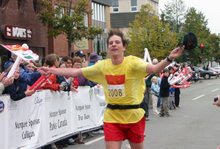
On the Run
Nutrition and Hydration High Priority for Runners
Nutrition and Hydration High Priority for Runners

Stan Chaisson
Starting a walking or running program can be demanding on your body. Running for long distances burns huge amounts of calories, so you need to ensure you have the proper nutrients and fluids in your body before, during and after your workouts to increase your
chances of success. Time and time again runners make the wrong nutritional decisions and this can make for a very uncomfortable experience. Here are a few things to remember for your next training walk or run. Make sure you eat at least two hours before a workout or event. This will allow the food to digest properly and the energy will be absorbed and available for the exercise bout.
Also drink lots of water. A runner should never feel thirsty and should drink up to a liter of water before an event and up to two liters a day during training. Even though you maybe running to the washroom a little more often it’s very important to have your tank
topped up before you go out the door. Make a visit to a friend, make a pit stop at a gas station, or if there’s a nearby freshwater spring, why not? No matter what you do, having plenty of fluids will delay fatigue and improve performance.
On the other hand, if you don’t eat or eat too long before a run, your body will use up all
the nutrients from your last meal and even tap into your stored energy well before you
ever step foot on the racecourse. This can lead to premature fatigue and poor race
performance, also known as hitting the wall. I can’t suggest the perfect pre race meal
because everyone’s body is unique and may react differently to certain foods, but some
suggestions are peanut butter and toast, bananas, or oatmeal. The key is to try different
foods in your training runs and see what works for you.
Even though you may have fueled up before your run, you’re not in the clear. During
your run you still need to consider the risks of dehydration and energy depletion. If you
exercise more than an hour you should be consuming carbohydrates such as sports drinks,
sport gels or even candy periodically during your event. One to two servings of a drink
like Gatorade or PowerAde or 1-2 servings of sports gels per hour should do the trick.
You should also consider fluid needs. During hot and humid days, your body can lose
much needed water and can cause weight loss up to 2-4 pounds depending on how far
you run. This will not only decrease speed and efficiency, it can also lead to stomach
problems, muscle cramping and dizziness. An easy solution is to wear a water belt, plant
water bottles along your training route (make sure the top is on tight to avoid unwanted
visitors) and take advantage of all water stops during your event even if you don’t feel
thirsty.
After your event is finished you should pay close attention to recovery. In the excitement
of such a great accomplishment sometimes the celebration and busy atmosphere of the
finish line can distract you and it’s easy to forget to re-fuel your body. Endurance
exercise, much like strength exercise, causes small damages to your muscles. Therefore
after such exercise, it’s important to begin muscle repair immediately after the race. A
balance of carbohydrates and protein is recommended as soon as you finish up. Most
events like the BMO Nesbitt Burns PEI Marathon will provide post race snacks and
goodies to get you energized and ready to celebrate your victory.
Stan Chaisson is a registered kinesiologist, trainer, avid runner, and exercise enthusiast. His weekly column will provide advice and training tips for those preparing for the BMO Prince Edward Island Marathon, October 18-19 (www.princeedwardislandmarathon.com)




























No comments:
Post a Comment